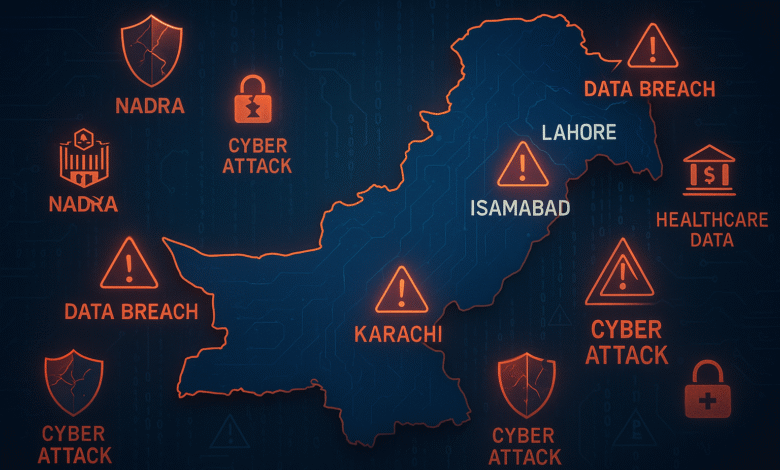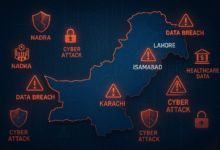Devastating Data Breaches That Shook Pakistan’s Digital Trust
Learn about major data breaches that shook Pakistan, affecting 184M users globally & 2.7M NADRA records. Complete cybersecurity analysis.

Pakistan’s digital transformation has brought remarkable opportunities, but it has also exposed the nation to unprecedented cyber threats. Over the past few years, several major data breaches that shook Pakistan have fundamentally challenged the country’s cybersecurity infrastructure and citizens’ trust in digital systems. From government databases to private sector platforms, these incidents have revealed critical vulnerabilities that demand immediate attention.
The scale and impact of these cyber incidents have raised serious questions about digital security measures across various sectors. As Pakistan continues its journey toward digitization, understanding these breaches becomes crucial for building a more secure digital future.
The 2025 Global Data Breach: 180 Million Pakistanis at Risk
In May 2025, Pakistan’s National Cyber Emergency Response Team (PKCERT) issued an urgent advisory regarding one of the most extensive data breaches that shook Pakistan’s digital landscape. The breach has compromised over 184 million passwords associated with leading digital platforms, including Google, Microsoft, Facebook, Instagram, Snapchat, and Apple, raising serious concerns for users worldwide, including in Pakistan.
The Scope of the Attack
This massive cybersecurity incident originated from InfoStealer malware, a sophisticated tool designed to silently extract sensitive information from infected systems. According to the advisory seen by Dawn.com, the breach involves a publicly available file containing over 184 million unique account details. These credentials were not encrypted or protected in any way.
The exposed data included:
- Usernames and passwords
- Email addresses
- URLs linked to various online services
- Government portal credentials
- Banking and financial information
- Healthcare system access details
Impact on Pakistani Users
Cybersecurity experts immediately raised concerns about the potential consequences for Pakistani users. Dr Shahid Sultan, a cybersecurity expert, stated that banking and financial accounts could be particularly vulnerable to unauthorized transactions. The breach put millions of Pakistanis at risk of identity theft, account hijacking, and financial fraud.
The timing of this incident was particularly concerning given Pakistan’s increasing reliance on digital services. With more citizens using online banking, e-commerce platforms, and government digital services, the potential for widespread damage became evident.
NADRA Data Breach: A National Security Crisis
Perhaps the most significant among data breaches that shook Pakistan was the National Database and Registration Authority (NADRA) incident, which came to light through investigations spanning several years. A Joint Investigation Team (JIT), which was formed to probe a data leak from the National Database and Registration Authority (Nadra), has told the Interior Ministry that the particulars of as many as 2.7 million citizens had been compromised between 2019 and 2023.
The Investigation Reveals Shocking Details
The JIT investigation uncovered a systematic breach that involved multiple NADRA offices across the country. The JIT report, the sources said, has identified that the data theft took place from the Multan, Karachi, and Peshawar offices of Nadra. Even more alarming was the international dimension of this cybercrime.
Sources said that, according to the report, there was evidence of Nadra data surfacing in Argentina and Romania. This revelation highlighted how personal information of Pakistani citizens had been trafficked across international borders, raising serious concerns about national security and citizen privacy.
Government Response and Accountability
The severity of this breach prompted immediate action from authorities. NADRA Chairman disclosed that one grade-19 officer and five others were terminated over the incident. However, critics argued that the response was insufficient given the scale of the breach and its implications for national security.
The stolen data included sensitive personal information such as:
- Complete citizen records
- Biometric data
- Address information
- Family details
- Identity card numbers
The PITB Healthcare Data Scandal
One of the earliest and potentially most devastating data breaches that shook Pakistan occurred in 2018, involving the Punjab Information Technology Board (PITB). In 2018, the Punjab Information Technology Board (PITB) was accused of a data leak that compromised personal data of millions of citizens, leading to an alarming increase in identity-theft crimes.
The Scale of Vulnerability
This could be the biggest data breach in the history of Pakistan as reports claimed that Punjab Information Technology Board (PITB) is responsible for creating vulnerable mobile applications directly connected with the API of NADRA, which can request details of any Pakistani citizen using different means.
The breach was particularly concerning because it involved:
- Direct access to NADRA databases
- Complete citizen profiles
- Criminal records
- Driving license details
- Hotel check-in information
- Call data records (CDR)
Underground Data Trading
What made this incident even more shocking was the emergence of organized data trading networks. A case study shows that several groups were existent on Facebook and WhatsApp where culprits were selling details of Pakistani nationals for just Rs. This revelation showed how easily personal information could be monetized through illegal channels.
Cybersecurity Challenges Across Sectors
The data breaches that shook Pakistan have highlighted vulnerabilities across multiple sectors, particularly in healthcare and financial services. Data protection must be a legal obligation, especially for organizations in finance, healthcare, and government sectors. These entities must be held accountable for safeguarding user data and reporting breaches swiftly and transparently.
Healthcare Sector Vulnerabilities
The healthcare sector has emerged as a prime target for cybercriminals globally, and Pakistan is no exception. Healthcare data is particularly valuable because it contains comprehensive personal information that can be used for various forms of fraud and identity theft.
Recent incidents have shown that healthcare providers in Pakistan often lack:
- Adequate encryption protocols
- Regular security updates
- Staff training on cybersecurity best practices
- Incident response procedures
Financial Sector Risks
Banking and financial institutions have also faced increasing cyber threats. The integration of digital banking services with inadequate security measures has created new vulnerabilities that cybercriminals are quick to exploit.
The Rise of Sophisticated Cyber Threats
Modern data breaches that shook Pakistan demonstrate the evolution of cyber threats facing the country. Cybercriminals are increasingly weaponising artificial intelligence to execute highly targeted attacks, perpetrate social engineering scams, and create convincing deepfakes for misinformation campaigns.
InfoStealer Malware and Advanced Persistent Threats
The 2025 global breach introduced many Pakistanis to the reality of InfoStealer malware. This type of malicious software operates silently in the background, collecting sensitive information over extended periods without detection. The sophistication of these tools demonstrates how cybercriminals have evolved their tactics.
Cross-Border Cybercrime Networks
The international dimension of these breaches has revealed complex cybercrime networks operating across borders. The JIT’s findings revealed that the data moved from Multan to Peshawar, then was transferred to Dubai, and eventually sold in Argentina and Romania. This international trafficking of personal data highlights the global nature of modern cybercrime.
Impact on Digital Trust and Economic Growth
The series of data breaches that shook Pakistan have had far-reaching consequences beyond immediate security concerns. In the wake of the breach, Pakistan’s digital security has come under intense international scrutiny. Global partners and investors are questioning the country’s capacity to safeguard sensitive data in the face of repeated large-scale leaks.
Erosion of Public Confidence
Each major breach has chipped away at public trust in digital services. Citizens who once embraced online banking, e-commerce, and digital government services have become increasingly hesitant to share personal information online. This erosion of trust directly impacts Pakistan’s digital economy growth potential.
International Reputation Damage
The reputational damage from these incidents extends beyond national borders. The reputational damage from such incidents is not easily reversed, and demands wide-ranging reforms and demonstrable improvements. International partners and potential investors now view Pakistan’s cybersecurity infrastructure with increased skepticism.
Government Response and Policy Initiatives
Recognizing the severity of these challenges, Pakistani authorities have begun implementing comprehensive cybersecurity measures. Pakistan’s own Cybersecurity Policy 2021 classifies citizen data protection as a matter of both state stability and public trust.
Establishment of PKCERT
The Pakistan Computer Emergency Response Team (PKCERT) has emerged as the country’s primary cybersecurity watchdog. The organization regularly issues advisories and coordinates responses to major cyber incidents, as demonstrated during the 2025 global breach response.
Also Read: Cybersecurity Essentials for Pakistani Small Businesses: Tools and Best Practices
Legislative Efforts
Pakistan has been working on strengthening its legal framework for data protection. The Personal Data Protection Bill, which will be drafted by the Ministry of Information Technology and has been approved by parliament, is a welcome step toward protecting personal information.
However, critics argue that legislation alone is insufficient without proper implementation and enforcement mechanisms.
Lessons Learned from Major Incidents
The data breaches that shook Pakistan have provided valuable insights into the country’s cybersecurity challenges and the steps needed to address them effectively.
The Importance of Employee Training
Many breaches involved internal collusion or human error, highlighting the critical need for comprehensive staff training. Some officials also colluded in issuing identity cards to Afghan nationals, demonstrating how insider threats can compound cybersecurity vulnerabilities.
Need for Regular Security Audits
The PITB incident particularly highlighted how vulnerable systems can remain undetected for extended periods. Regular security audits and penetration testing could help identify vulnerabilities before they can be exploited by malicious actors.
Incident Response Planning
The delayed discovery and response to several major breaches emphasized the importance of having robust incident response plans. Organizations need protocols for quickly identifying, containing, and recovering from cyber incidents.
Protecting Citizens: Individual Security Measures
While organizations bear primary responsibility for protecting user data, citizens also play a crucial role in cybersecurity. Recent advisories have emphasized several key protection measures:
Password Security Best Practices
PKCERT has advised the public to immediately change their passwords, ensuring they are strong and unique for each online account. This basic security practice becomes even more critical following major data breaches.
Multi-Factor Authentication
It also recommends enabling multi-factor authentication (MFA) wherever possible. MFA adds an extra layer of security by requiring an additional form of verification — such as a one-time password (OTP), biometric scan or hardware token — alongside the standard password.
Digital Hygiene Awareness
Citizens need education about recognizing phishing attempts, avoiding suspicious downloads, and being cautious about sharing personal information online. Citizens should also avoid downloading apps from unverified sources and think twice before sharing sensitive details online.
The Path Forward: Building Digital Resilience
The data breaches that shook Pakistan have served as wake-up calls for the urgent need to strengthen the country’s cybersecurity infrastructure. Several key areas require immediate attention:
Investment in Modern Technology
To stay ahead of such risks, Pakistan’s cybersecurity strategy must prioritise investment in AI and machine learning. These technologies can also enhance data security and privacy through innovations such as blockchain and decentralised identity management.
Public-Private Collaboration
Effective cybersecurity requires collaboration between government agencies, private sector organizations, and international partners. Sharing threat intelligence and best practices can help create a more robust defense against cyber threats.
Education and Awareness Programs
Building a cybersecurity culture requires comprehensive education programs targeting both professionals and general citizens. Understanding cyber threats and protection measures should become part of basic digital literacy.
International Cooperation
Given the cross-border nature of modern cybercrime, Pakistan must strengthen its international cooperation in cybersecurity matters. Pakistan’s active engagement in global frameworks — such as the Budapest Convention on Cybercrime — and the formation of bilateral cyber law enforcement agreements will enhance its ability to track, apprehend, and prosecute offenders across borders.
Conclusion: Learning from Crisis
The devastating data breaches that shook Pakistan have exposed critical vulnerabilities while also catalyzing important improvements in the country’s cybersecurity posture. From the NADRA incident affecting millions of citizens to the global breach of 2025, these events have highlighted both the scale of the challenge and the urgency of the response required.
The recent breach affecting 180 million Pakistani users is a stark reminder of the urgency for comprehensive reform. Cybersecurity is not merely a technical issue — it is a societal challenge requiring multidisciplinary solutions, coordinated public policy, legal reform, and active public participation.
As Pakistan continues its digital transformation journey, the lessons learned from these major cybersecurity incidents must guide future policy decisions and infrastructure investments. The cost of inaction is too high – not just in financial terms, but in terms of citizen trust, national security, and the country’s digital future.
Building a secure digital Pakistan requires sustained effort from all stakeholders. Government agencies, private companies, and citizens must work together to create a cybersecurity culture that protects personal privacy while enabling the benefits of digital innovation. Only through such comprehensive efforts can Pakistan rebuild and strengthen the digital trust that these devastating breaches have so severely damaged.
The road ahead is challenging, but the data breaches that shook Pakistan have also created opportunities for meaningful reform and improvement. By learning from these incidents and implementing robust security measures, Pakistan can emerge stronger and more resilient in the face of future cyber threats.











